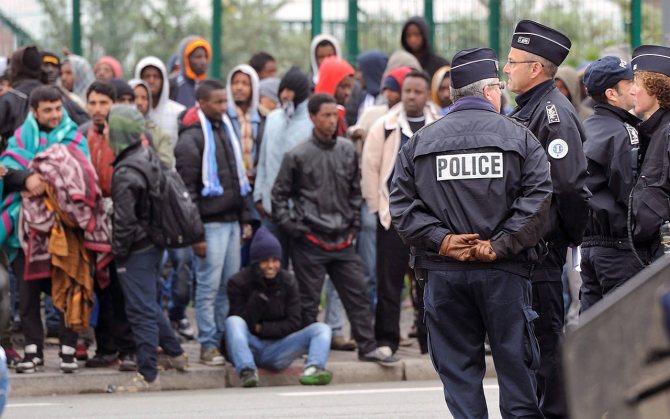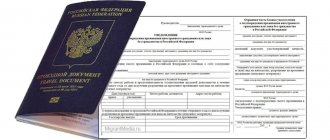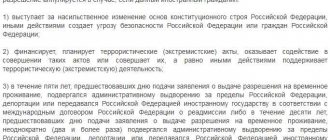The stay of foreign citizens and stateless persons on the territory of the Russian Federation is regulated by a number of regulations. The slightest violation of the requirements of any of them entails certain sanctions. The extreme measure is the expulsion of a foreign citizen or stateless person from the Russian Federation. Most often we are talking about deportation or expulsion - concepts that are similar, but not identical. In this article, we will consider the essence of each measure separately and try to understand what the differences between expulsion and deportation are.
Deportation concept
To get an idea of deportation, let’s turn to the primary source - dated July 25, 2002 No. 115-FZ (as amended, which came into force on January 11, 2018). The concept of “deportation” is interpreted here as the forced expulsion of a foreigner abroad of the Russian Federation in the absence of legal grounds for his stay in the country.
Let us immediately outline the difference between deportation and expulsion in order to avoid confusion in terminology. The concept of “expulsion” is broader in meaning than the term “deportation” and is the defining word in its definition. The main reason for deportation is violation of migration policy, namely:
- cancellation;
- absence or ;
- expired visa.
If facts of violation of the migration regime are discovered, the foreigner faces deportation and an entry ban as a possible consequence. The deportation of foreigners is not a punishment in its purest form; rather, it is a government measure aimed at preventing... However, the consequences of deportation can be quite serious.
We recommend that you familiarize yourself with the process in more detail.
How is administrative deportation determined?
Administrative deportation can only be imposed on foreign citizens and stateless persons. The exclusive right to apply this type of punishment is reserved to the court, but the exception is cases of offenses committed by foreign citizens at the border, since in this case this measure can be applied by other bodies and officials. Before expulsion is applied, the guilty person may be held in a special institution for a certain amount of time. The procedure itself can be implemented in two main forms: forced departure and controlled independent departure. The specific form of deportation is chosen by the court in each case, but in practice, independent controlled deportation is applied to violators based on the results of their first administrative offense.
Concept of expulsion
The concept of deportation is enshrined in the Code of Administrative Offenses of the Russian Federation of December 30, 2001 No. 195-FZ as a measure of punishment for foreign citizens and stateless persons. The exception is foreign military personnel.
Thus, deportation is one of the types of punishment, because the reasons leading to it lie in the plane of administrative offenses.
The main document, which details the punishment procedure, is Article 34 of Federal Law No. 115.
The following offenses may cause deportation:
- violation of the regime (Article 18.1 Part 2), in the border zone (Article 18.2 Part 1.1) and checkpoints;
- violation of the rules of entry and stay in the Russian Federation (Article 18.8);
- transportation, storage, sale, consumption, promotion of narcotic drugs (Articles 6.8, 6.9, 6.13, 20.20);
- propaganda of non-traditional sexual relations among minors (Article 6.21);
- evasion of execution of administrative punishment (Article 20.25) and other actions that violate the norms of the Code of Administrative Offenses of the Russian Federation.
Find out even more information about the reasons for.
What is deportation and expulsion
Deportation is the forced expulsion of a foreign citizen outside the state or to another country. Deportation can be either voluntary, when a foreign citizen independently leaves the country’s border , or forced, when a person leaves the country accompanied by an escort. The second is applicable in the case of a citizen’s obvious reluctance to leave the country.
The reasons for using such a name can be very different, but most often deportation is used in cases where a foreign citizen:
- Arrived illegally on the territory of the Russian Federation;
- Lives on false documents;
- Violated the rules of residence or stay on the territory of the Russian Federation;
- Violated the law of the Russian Federation;
- Does not have all the documents necessary for stay (registration or migration card);
- Possesses documents for legal stay in the Russian Federation, the validity of which has come to an end.
However, if everything is quite simple with the deportation of foreign citizens, then how is deportation different? Despite the great similarity with deportation, these two concepts differ in legal nature, and also have some differences in the grounds for application. Expulsion is a measure of legal responsibility, and deportation is a measure of managerial influence in the area of ensuring control over the stay of foreign citizens.
The decision to apply deportation is made at the state level, and the period of execution of the punishment varies from 3 to 15 days. An increase in the period to 15 days is applied in cases where the cancellation of documents of a foreign citizen is required. You are given 10 working days to appeal this penalty , and the appeal is made through the court.
Who decides on the need for expulsion and deportation?
While on the territory of the Russian state, foreigners are required to comply with the requirements of the law and administrative order. This is strictly monitored by the relevant authorities and services.
Thus, if an administrative violation occurs, courts and other subjects of administrative jurisdiction are involved in its investigation. The case is initiated only upon the fact of a violation, it goes through a procedure of proving guilt, as a result of which a decision is made, including the forced and controlled deportation of a foreigner from the Russian Federation.
In case of violation of the migration regime, the case is transferred to the territorial body of the Main Directorate for Migration of the Ministry of Internal Affairs. The decision to deport does not require a trial; one reason is sufficient – lack of right to reside in the country. The Department of Justice resolution may also influence the deportation decision.
Who makes the decision on deportation and removal?
While a foreign citizen is on the territory of the Russian Federation, he is obliged to follow the norms of Russian legislation. The relevant services are monitoring this. If the law is violated, the case is investigated by the court or other authorities. A case can only be initiated based on the fact of a violation, after which the guilt of the violator is proven, and then a decision is made on independent or forced expulsion.
If there is a violation of the migration regime, the case will be transferred to the Main Directorate for Migration of the Ministry of Internal Affairs (migration authority). A court hearing is not required to decide on deportation; for this purpose, only such grounds as the lack of rights to stay in the Russian Federation are sufficient.
At whose expense is the deportation carried out?
Leaving the country requires certain expenses (paperwork, purchasing travel tickets, maintenance), which raises a completely logical question: who will pay for the move? It is logical to assume that this should be done by the foreigner or stateless person himself, since he is the violator. This assumption is confirmed by the laws of the Russian Federation, where other options are considered if the migrant does not have funds.
Thus, in case of an administrative violation, expulsion can be carried out from other sources:
- at the expense of the embassy of the country from which the offender arrived;
- at the expense of the inviting party (international organization, individual or legal entity);
- at the expense of the employer, if the company acts as an inviting party;
- at the expense of the federal budget of the Russian Federation.
During deportation, there is only one source of funding, with the exception of the foreigner himself - budget funds of the Russian Federation. This is another significant sign of the difference between deportation and expulsion.
Voluntary travel outside Russia
In both cases, the violator is given the right to voluntarily leave the Russian state. Once a violation has been identified, the migrant receives an order or court order to leave the country and an offer to do so voluntarily.
The difference between administrative expulsion and deportation is only that in the first case, voluntary departure is carried out in the form of an independent controlled departure, i.e. under the control of the executive authority in the field of migration.
Distinctive features of expulsion and deportation

A more precise analysis of the terms “expulsion” and “deportation” allows us to understand the difference inherent in their definitions.
- Expulsion is an administrative punishment. It is appointed on the basis of a decision in a criminal case. Its imposition is possible only after consideration of the elements of the violation. Administrative deportation is carried out when the foreigner’s guilt in committing a particular unlawful act is fully proven. In turn, deportation is a measure of coercion on the part of the state. The decision can be made by a representative of the executive authority in the field of migration in relation to a person who did not leave the country on time. To do this, it is necessary to prove that the person’s continued presence on the territory of Russia has become illegal or poses a potential danger. The difference is also that the actions of a foreigner are not considered an offense.
- Administrative expulsion is carried out only after the decision comes into force. Deportation must take place no later than five days after service of the decision. If a residence permit is cancelled, departure is required within fifteen days.
- The deadlines for appeal also vary. When a citizen receives a deportation decision, the foreigner is given the opportunity to appeal it within three months after notification. A complaint regarding expulsion is made within ten days from the date of delivery of the decision. If deadlines are missed, it is possible to file a supervisory complaint.
- The grounds for cancellation by a judicial authority are also not the same. Thus, administrative deportation is canceled in one of three cases:
- the statute of limitations for this offense has expired;
- the elements of the action or inaction have not been proven;
- There were serious procedural violations during the consideration of the case that did not allow the procedure to be followed.
Deportation is canceled by court if several circumstances coincide. The decision must simultaneously not comply with the current legislation of the country and violate civil, political and other human rights.
In addition, deportation occurs at the expense of the federal budget if the inviting person has not been identified. Expulsion involves leaving at the expense of the expelled person, the institution, organization or representative office that invited him.
Time limits for expulsion and deportation
Compliance with the deadlines for leaving the Russian Federation is extremely important, especially if we are talking about a voluntary decision. If you do not leave the country on time, this may qualify as a repeated violation of the migration regime, which will require more stringent eviction measures and cause consequences in the form of restrictions or.
In search of an answer about the timing, let us turn again to the legislation of the Russian Federation. The Code of Administrative Offenses prescribes leaving the country's borders within 5 days after the court decision comes into force in case of voluntary controlled departure; if the migrant refuses to leave the country on his own, forced controlled expulsion is applied to the migrant.
The timing of leaving the country during deportation is determined depending on the reason. If the terms of residence or temporary stay in the Russian Federation are not observed, the violator must leave the country within 3 days; if the reason was or, then he is given 15 days to leave.
Administrative expulsion and deportation
Administrative deportation is a measure of administrative punishment and is assigned to the guilty person by the court along with an administrative fine, and deportation is a measure of administrative restraint that is applied due to the loss or termination of legal grounds for the stay or residence of a foreign citizen or stateless person on the territory of the Russian Federation.
Grounds for deportation:
- In the event that the period of residence or temporary stay of a foreign citizen in the Russian Federation is shortened, and this foreign citizen does not leave the Russian Federation within 3 days.
- In the event that a temporary residence permit or residence permit issued to a foreign citizen is canceled and this foreign citizen does not leave the Russian Federation within 15 days.
- If in relation to a foreign citizen, a decision has been made on the undesirability of staying (residence) in the Russian Federation or in respect of whom a decision has been made not to allow entry into the Russian Federation;
- If there is no international treaty on readmission between the Russian Federation and the state of citizenship or permanent or primary residence of a given foreign citizen, and a foreign citizen accepted by the Russian Federation from a foreign state in accordance with the international treaty of the Russian Federation on readmission does not have legal grounds for stay (residence) in RF.
Grounds for administrative expulsion:
- Illicit drug trafficking;
- Consumption of narcotic drugs without a doctor's prescription;
- Violation of the regime of the State Border of the Russian Federation;
- Violation of the regime at checkpoints across the State Border of the Russian Federation;
- Violation by a foreign citizen or stateless person of the rules of entry into the Russian Federation or the regime of stay (residence) in the Russian Federation;
- Illegal employment by a foreign citizen or stateless person in the Russian Federation;
- Violation of immigration rules;
- Failure by a foreign citizen or stateless person to comply with restrictions on the implementation of certain types of activities established in accordance with federal law in relation to foreign citizens or stateless persons;
- Violation by a foreign citizen or stateless person subject to readmission of mandatory rules related to the implementation of the international treaty of the Russian Federation on readmission;
- Submission of false information when performing migration registration;
- Evasion of a foreign citizen or stateless person from the execution of an administrative penalty in the form of administrative deportation in the form of controlled independent departure from the Russian Federation.
The decision on administrative expulsion is made by the court. The decision on administrative deportation can be implemented through the procedure of forced deportation from the Russian Federation or through the procedure of controlled independent departure from the Russian Federation.
The decision on deportation is made by the authorized executive body; its decision is extrajudicial in nature and is applied regardless of whether the foreign citizen or stateless person committed or did not commit an administrative offense.
A foreign citizen or stateless person who has been assigned an administrative penalty in the form of administrative deportation from the Russian Federation in the form of a controlled independent exit from the Russian Federation is required to leave the Russian Federation within 5 days after the date on which the judge’s decision on imposing the appropriate administrative penalty comes into force.
In order to execute the administrative punishment imposed on a foreign citizen or stateless person in the form of forced deportation from the Russian Federation, the judge has the right to impose detention on such persons in a special institution of the Federal Migration Service.
If in relation to a foreign citizen, a decision has been made on the undesirability of staying in the Russian Federation or in respect of whom a decision has been made not to allow entry into the Russian Federation;
Deadlines for appeal
In this section, we will look at the difference between deportation and administrative expulsion in terms of the time frame for appealing a decision to evict a foreign citizen from Russia. In both cases, this can be appealed: the decision on deportation is appealed by a claim based on jurisdiction, and the decision on deportation is appealed by jurisdiction.
To appeal the deportation, 10 days are allotted from the date of the charge. It is important to file a complaint within ten days. In this case, one can hope to extend the appeal period if the judge sees a good reason in the claim. The next step after the appeal is a cassation appeal. It must be submitted immediately after the court’s verdict.
The law allows a three-month period after the foreigner receives the notice to appeal deportation.
There are two ways to cancel a deportation order:
- in court, by filing an application to challenge the migrant’s decision or at the location of the territorial department of the Main Migration Directorate of the Ministry of Internal Affairs that issued such a decision;
- in an administrative manner, when the complaint is transferred to the head of the body responsible for the migration service.
What do expulsion and deportation have in common?
So far we have looked at the differences between these two concepts and measures of influence on migrants. There turned out to be quite a lot of them, so not everyone will be able to immediately determine what is worse – deportation or expulsion, which often leads to confusion in terms and confusion of concepts.
Probably because both measures of influence are aimed exclusively at foreign citizens and stateless persons and have the same result - the eviction of the foreigner from the country.
Differences between expulsion and deportation to the Russian Federation in 2021
The stay of foreign citizens and stateless persons on the territory of the Russian Federation is regulated by a number of regulations. The slightest violation of the requirements of any of them entails certain sanctions. The extreme measure is the expulsion of a foreign citizen or stateless person from the Russian Federation. Most often we are talking about deportation or expulsion - concepts that are similar, but not identical. In this article, we will consider the essence of each measure separately and try to understand what the differences between expulsion and deportation are.
Deportation concept
To get an idea of deportation, let's turn to the primary source - the Law “On the Legal Status of Foreign Citizens in the Russian Federation” dated July 25, 2002 No. 115-FZ (as amended, which came into force on January 11, 2021). The concept of “deportation” is interpreted here as the forced expulsion of a foreigner abroad of the Russian Federation in the absence of legal grounds for his stay in the country.
Let us immediately outline the difference between deportation and expulsion in order to avoid confusion in terminology. The concept of “expulsion” is broader in meaning than the term “deportation” and is the defining word in its definition. The main reason for deportation is violation of migration policy, namely:
If facts of violation of the migration regime are discovered, the foreigner faces deportation and an entry ban as a possible consequence. The deportation of foreigners is not a pure punishment; rather, it is a government measure aimed at preventing illegal migration. However, the consequences of deportation can be quite serious.
We recommend that you familiarize yourself with the deportation process in more detail.
Concept of expulsion
The concept of expulsion is enshrined in Article 3.10 of the Code of Administrative Offenses of the Russian Federation (CAO RF) dated December 30, 2001 No. 195-FZ as a measure of punishment for foreign citizens and stateless persons. The exception is foreign military personnel.
Thus, deportation is one of the types of punishment, because the reasons leading to it lie in the plane of administrative offenses.
The main document, which details the punishment procedure, is Article 34 of Federal Law No. 115.
The following offenses may cause deportation:
- violation of the regime for crossing the state border of the Russian Federation (Article 18.1 Part 2), in the border zone (Article 18.2 Part 1.1) and checkpoints;
- violation of the rules of entry and stay in the Russian Federation (Article 18.8);
- transportation, storage, sale, consumption, promotion of narcotic drugs (Articles 6.8, 6.9, 6.13, 20.20);
- propaganda of non-traditional sexual relations among minors (Article 6.21);
- evasion of execution of administrative punishment (Article 20.25) and other actions that violate the norms of the Code of Administrative Offenses of the Russian Federation.
Find out even more information about the reasons for administrative deportation.
Who decides on the need for expulsion and deportation?
While on the territory of the Russian state, foreigners are required to comply with the requirements of the law and administrative order. This is strictly monitored by the relevant authorities and services.
Thus, if an administrative violation occurs, courts and other subjects of administrative jurisdiction are involved in its investigation. The case is initiated only upon the fact of a violation, it goes through a procedure of proving guilt, as a result of which a decision is made, including the forced and controlled deportation of a foreigner from the Russian Federation.
In case of violation of the migration regime, the case is transferred to the territorial body of the Main Directorate for Migration of the Ministry of Internal Affairs. The decision to deport does not require a trial; one reason is sufficient – lack of right to reside in the country. The Department of Justice resolution may also influence the deportation decision.
At whose expense is the deportation carried out?
Leaving the country requires certain expenses (paperwork, purchasing travel tickets, maintenance), which raises a completely logical question: who will pay for the move? It is logical to assume that this should be done by the foreigner or stateless person himself, since he is the violator. This assumption is confirmed by the laws of the Russian Federation, where other options are considered if the migrant does not have funds.
Thus, in case of an administrative violation, expulsion can be carried out from other sources:
- at the expense of the embassy of the country from which the offender arrived;
- at the expense of the inviting party (international organization, individual or legal entity);
- at the expense of the employer, if the company acts as an inviting party;
- at the expense of the federal budget of the Russian Federation.
During deportation, there is only one source of funding, with the exception of the foreigner himself - budget funds of the Russian Federation. This is another significant sign of the difference between deportation and expulsion.
Voluntary travel outside Russia
In both cases, the violator is given the right to voluntarily leave the Russian state. Once a violation has been identified, the migrant receives an order or court order to leave the country and an offer to do so voluntarily.
The difference between administrative expulsion and deportation is only that in the first case, voluntary departure is carried out in the form of an independent controlled departure, i.e. under the control of the executive authority in the field of migration.
Time limits for expulsion and deportation
Compliance with the deadlines for leaving the Russian Federation is extremely important, especially if we are talking about a voluntary decision. If a migrant does not leave the country on time, this may be qualified as a repeated violation of the migration regime, which will require more stringent eviction measures and lead to consequences in the form of a restriction or ban on entry into Russia.
In search of an answer about the timing, let us turn again to the legislation of the Russian Federation. The Code of Administrative Offenses prescribes leaving the country's borders within 5 days after the court decision comes into force in case of voluntary controlled departure; if the migrant refuses to leave the country on his own, forced controlled expulsion is applied to the migrant.
The timing of leaving the country during deportation is determined depending on the reason. If the terms of residence or temporary stay in the Russian Federation are not met, the violator must leave the country within 3 days; if the reason was the cancellation of the temporary residence permit or residence permit, then he is given 15 days to leave.
Deadlines for appeal
In this section, we will look at the difference between deportation and administrative expulsion in terms of the time frame for appealing a decision to evict a foreign citizen from Russia. In both cases, this can be appealed: the decision on deportation is appealed by a claim based on jurisdiction, and the decision on deportation is appealed by jurisdiction.
To appeal the deportation, 10 days are allotted from the date of the charge. It is important to file a complaint within ten days. In this case, one can hope to extend the appeal period if the judge sees a good reason in the claim. The next step after the appeal is a cassation appeal. It must be submitted immediately after the court’s verdict.
The law allows a three-month period after the foreigner receives the notice to appeal deportation.
There are two ways to cancel a deportation order:
- in court, by filing an application to challenge the decision at the migrant’s place of stay or at the location of the territorial department of the Main Migration Directorate of the Ministry of Internal Affairs that issued such a decision;
- in an administrative manner, when the complaint is transferred to the head of the body responsible for the migration service.
What do expulsion and deportation have in common?
So far we have looked at the differences between these two concepts and measures of influence on migrants. There turned out to be quite a lot of them, so not everyone will be able to immediately determine what is worse – deportation or expulsion, which often leads to confusion in terms and confusion of concepts.
Probably because both measures of influence are aimed exclusively at foreign citizens and stateless persons and have the same result - the eviction of the foreigner from the country.
Summarize
The main conclusion we draw is that deportation and expulsion are different instruments of influence on migrants. And although in both cases the result will be the expulsion of a foreign citizen or stateless person outside the Russian Federation, the choice of one or another measure will have different goals, grounds and consequences.
Expulsion is used to prevent offenses and crimes on the territory of the Russian Federation, and deportation is aimed at combating illegal migration. As for the consequences, the most serious ones await the migrant as a result of expulsion. The court may impose a ban on entry into Russia for a period of 3.5 or 10 years.
Deportation, as a rule, does not have serious legal consequences, except that refusal to voluntarily leave the country can result in a ban on entry for several years. It happens that deported citizens are not aware of the consequences of this procedure. To avoid misunderstandings at the border, we recommend checking your documents in advance on the website of the Main Migration Department of the Ministry of Internal Affairs for any entry bans.
If you do not leave the Russian Federation after the ban (expulsion, deportation), what problems will follow: Video
Similar articles
How many times can you appeal a ban on entry into the Russian Federation (expulsion, deportation, etc.)?
On the administrative expulsion of foreign citizens from the territory of the Russian Federation
10/07/2016 On violation of the rules of entry into the Russian Federation by a foreign citizen or stateless person
WHY DO THEY DEPORT IF YOU HAVE AN OFFICIAL JOB, PATENT AND REGISTRATION?
Summarize
The main conclusion we draw is that deportation and expulsion are different instruments of influence on migrants. And although in both cases the result will be the expulsion of a foreign citizen or stateless person outside the Russian Federation, the choice of one or another measure will have different goals, grounds and consequences.
Expulsion is used to prevent offenses and crimes on the territory of the Russian Federation, and deportation is aimed at combating illegal migration. As for the consequences, the most serious ones await the migrant as a result of expulsion. The court may impose a ban on entry into Russia for a period of 3.5 or 10 years.
Deportation, as a rule, does not have serious legal consequences, except that refusal to voluntarily leave the country can result in a ban on entry for several years. It happens that deported citizens are not aware of the consequences of this procedure. To avoid misunderstandings at the border, we recommend checking your documents in advance on the website of the Main Migration Department of the Ministry of Internal Affairs for any entry bans.
Expulsion and deportation
People often confuse expulsion from the country with deportation. These are different concepts, and there should not be any confusion here. Deportation involves the exclusively forced expulsion of a foreign national from the territory of the Russian Federation. A decision regarding deportation can only be applied when a person refuses to voluntarily leave Russian territory.
Deportation also involves the establishment of a “barrier” that prevents the subsequent entry of a foreigner into the territory of the Russian state. Lawyers also highlight 4 more differences between expulsion and deportation:
- the decision regarding deportation can be made by an employee of the Federal Migration Service;
- the decision regarding deportation must be executed within five days;
- the decision regarding deportation can be appealed within 90 days;
- a decision regarding deportation can only be appealed if it violates the rights of a foreign national.
Expulsion from the Russian Federation is always carried out at the expense of personal funds. If a person cannot independently pay for his departure from Russian territory, then this responsibility falls on the shoulders of the inviting party. In some cases, the expulsion of a foreign national is carried out at the expense of the diplomatic service. institutions of his country.







